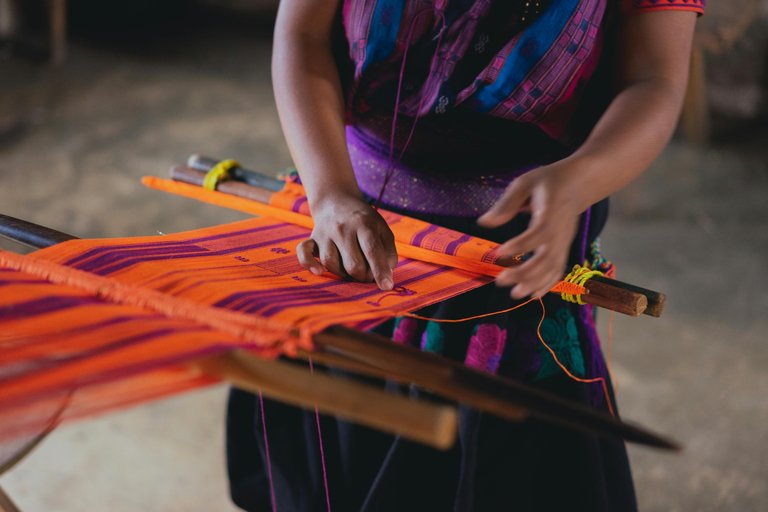Hispaliterario 42 / El refugio de las hebras / The shelter of the strands
En un rincón de la sala, donde la luz de una lámpara vieja titubea como una luciérnaga cansada, Aida teje sin pausa. El zumbido de su máquina de coser llena el aire, un canto monótono que se mezcla con el aroma a café recién colado y el roce de las agujas contra la tela. Sus manos, curtidas, pero ágiles, dan forma a suaves franelas, faldas de vuelo ligeras y pantalones de corte sencillo. Cada puntada es un desafío al destino, un hilo de resistencia que se niega a romperse.
Hace unas semanas, Frank, su esposo, cruzó el umbral con los hombros hundidos, las manos vacías y el peso de una cosecha que nunca maduró. El hombre que siempre había cargado el sustento de la casa sobre su espalda ahora vagaba por las habitaciones como un barco a la deriva, perdido en un mar de incertidumbre.
Pero Aida no permitió que el silencio los ahogara. Aquella noche, mientras el viento golpeaba las ventanas con dedos fríos, ella se acercó a Frank con una taza de café humeante, el vapor dibujando volutas en la penumbra. "Yo sé tejer, y tú sabes vender", le dijo, su voz firme como el primer rayo de sol tras la tormenta. Al alba, desenterró su vieja máquina de coser de un baúl polvoriento y desplegó los restos de lana y retazos de tela que guardaba como tesoros olvidados. Las primeras prendas fueron humildes —una franela para el vecino, una falda para su esposa—, pero pronto el rumor de su destreza se esparció como el aroma del pan recién horneado por las calles del pueblo. Aida tejía con amor, con una fuerza callada, como si cada hebra fuera un ladrillo en el puente hacia un mañana más firme.
Frank, al verla trabajar bajo la luz ámbar de la lámpara, sintió que algo se encendía en su pecho. Al principio, la vergüenza le pesaba como un yugo —él, el hombre de la casa, reducido a espectador—, pero la gratitud pronto brotó como hierba entre las grietas. Una mañana, cargó una mochila con las creaciones de Aida y partió hacia el mercado, el crujido de la grava bajo sus botas, marcando el ritmo de su nueva misión. "Esto lo hizo Aida, mi roca", anunciaba con la cabeza en alto, y los compradores, atraídos por la calidez de las telas y la historia de una pareja que se negaba a doblegarse, vaciaban sus bolsillos con sonrisas.
No todo fue fácil. Hubo noches en que Aida cosía hasta que el alba pintaba el cielo de rosa, los dedos entumecidos y los ojos ardiendo, mientras el eco de la máquina resonaba como un latido obstinado. Hubo días en que Frank regresaba con la mochila intacta, el polvo del camino pegado a su piel y la derrota en la mirada. Pero ella lo esperaba siempre con un plato de sopa caliente y un "mañana será mejor", sus palabras, un bálsamo que curaba las heridas del desaliento. Y él, poco a poco, dejó de verso como un hombre roto y empezó a reconocer en Aida el faro que lo guiaba a puerto.
El tiempo trajo frutos. Los pedidos se multiplicaron como flores tras la lluvia, y Aida enseñó a sus hijas a tejer, sus risas llenando la sala mientras las agujas danzaban entre sus manos pequeñas. Frank, con el sudor de sus caminatas, consiguió un puesto fijo en el mercado, una tabla de madera donde las prendas de Aida brillaban como promesas. Lo que nació como un esfuerzo por no hundirse se transformó en un negocio que alimentaba no solo sus cuerpos, sino también sus almas. Una tarde, mientras contaba las monedas del día sobre la mesa gastada, Frank tomó la mano de Aida, sus dedos ásperos rozando los de ella, y murmuró: "Sin tus hilos, nos habríamos deshecho. Gracias por sostenerme". Ella lo miró, los ojos brillando como la lámpara que aún los alumbraba, y respondió: "Tú me diste el valor para empezar. Lo hicimos juntos".
The shelter of the strands
In a corner of the room, where the light of an old lamp flickers like a tired firefly, Aida knits without pause. The hum of her sewing machine fills the air, a monotonous chirping that mingles with the aroma of freshly brewed coffee and the scraping of needles against fabric. Her weathered, yet nimble hands shape soft flannels, lightly flowing skirts and simply cut pants. Each stitch is a challenge to fate, a thread of resistance that refuses to break.
A few weeks ago, Frank, her husband, crossed the threshold with slumped shoulders, empty hands and the weight of a harvest that never ripened. The man who had always carried the livelihood of the household on his back now wandered the rooms like a drifting ship, lost in a sea of uncertainty.
But Aida did not allow the silence to drown them. That night, as the wind tapped the windows with cold fingers, she approached Frank with a steaming cup of coffee, the steam drawing wisps in the gloom. “I know how to knit, and you know how to sell,” she told him, her voice steady as the first ray of sunshine after the storm. At dawn, she unearthed her old sewing machine from a dusty trunk and unfolded the scraps of wool and scraps of fabric she kept like forgotten treasures. The first garments were humble - a flannel for the neighbor, a skirt for his wife - but soon the rumor of her skill spread like the aroma of freshly baked bread through the village streets. Aida wove with love, with quiet strength, as if each strand were a brick in the bridge to a firmer tomorrow.
Frank, watching her work under the amber light of the lamp, felt something ignite in his chest. At first, shame weighed on him like a yoke-he, the man of the house, reduced to a spectator-but gratitude soon sprang up like grass between the cracks. One morning, he loaded a backpack with Aida's creations and set off for the market, the crunch of gravel beneath his boots setting the pace for his new mission. “This was made by Aida, my rock,” she announced with her head held high, and shoppers, drawn by the warmth of the fabrics and the story of a couple who refused to bend, emptied their pockets with smiles.
It wasn't all easy. There were nights when Aida would sew until dawn painted the sky pink, fingers numb and eyes burning, while the echo of the machine echoed like a stubborn heartbeat. There were days when Frank would return with his backpack intact, the dust of the road sticking to his skin and defeat in his eyes. But she always waited for him with a bowl of hot soup and a “tomorrow will be better”, her words, a balm that healed the wounds of discouragement. And he, little by little, ceased to verse like a broken man and began to recognize in Aida the lighthouse that guided him to port.
Time brought fruit. Orders multiplied like flowers after rain, and Aida taught her daughters to knit, their laughter filling the room as the needles danced between their small hands. Frank, with the sweat of his walks, got a fixed stall in the market, a wooden board where Aida's garments shone like promises. What was born as an effort not to sink turned into a business that fed not only their bodies, but also their souls. One afternoon, as he counted the day's coins on the worn table, Frank took Aida's hand, his rough fingers brushing hers, and murmured, “Without your threads, we would have fallen apart. Thank you for holding me.” She looked up at him, eyes shining like the lamp that still lit them, and replied, “You gave me the courage to start. We did it together.”

Este relato es la historia de mi prima y su familia

CRÉDITOS
Banner elaborado en PSD con fotos propias y logo de IAFO
Logos redes sociales
Traductor Deepl